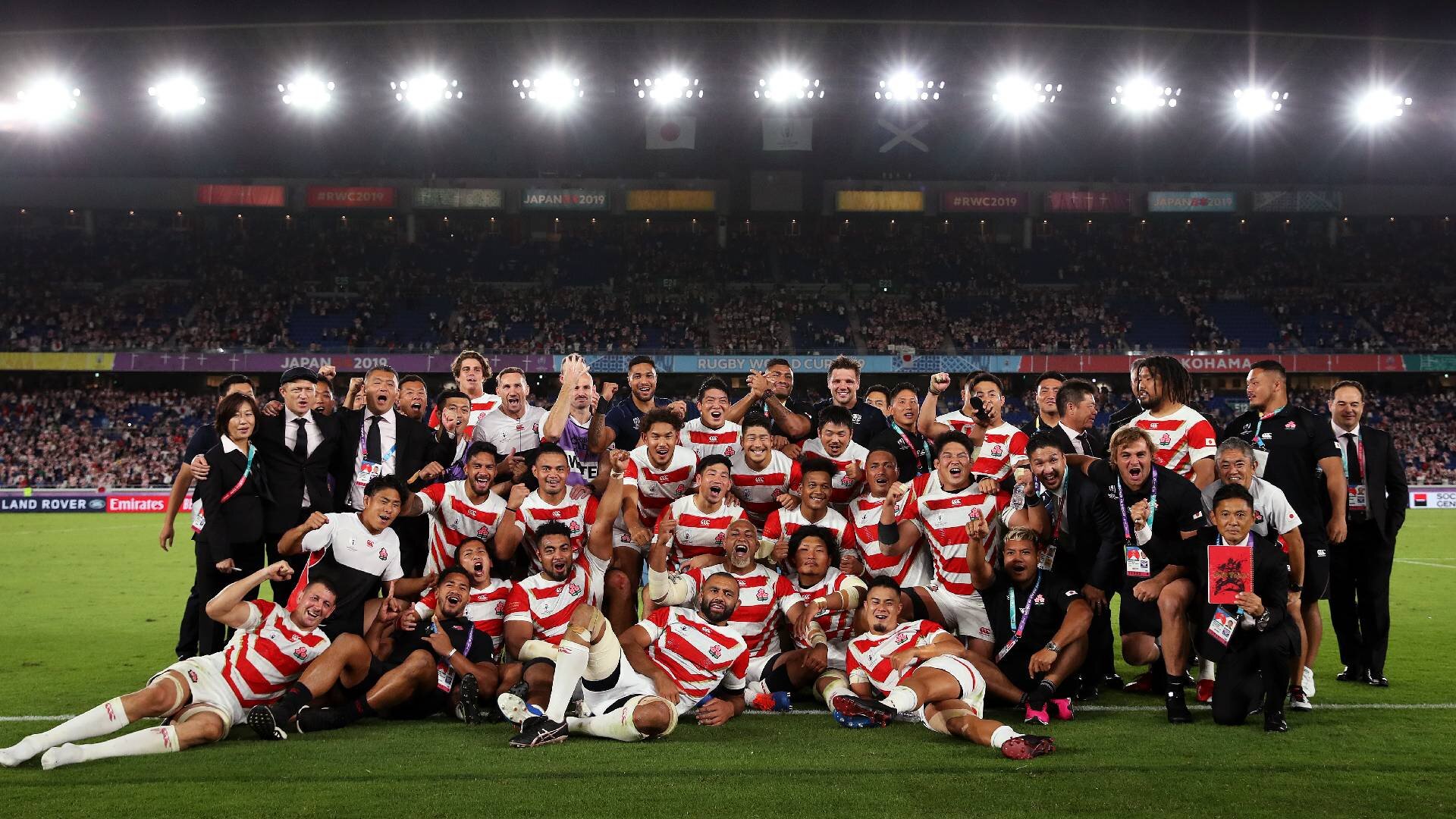The unlikely heroes behind Japan's dream run to the World Cup quarter-finals

They may have been the easy-beats of Super Rugby since their induction into the competition in 2016, but the soon-to-be-omitted Sunwolves have played a key role in Japan’s unprecedented World Cup success.
That’s the belief of Brave Blossoms head coach Jamie Joseph, who helped steer the Japanese national side to a first-ever win over Scotland in Yokohama last night.
The 28-21 victory not only eliminated the Six Nations heavyweights from the tournament at the pool stage, but it also solidified Japan’s place in the knockout stages for the first time in their history after blitzing Pool A with four wins from four outings – including an historic 19-12 win over Ireland in Shizuoka.
Prior to this tournament, Japan had only won four of their previous 28 World Cup matches, with three of those wins coming during their stunning 2015 campaign, where they were cruelly denied entry into the quarter-finals after Scotland defeated them to cancel out their shock 34-32 win over South Africa.
Four years later, and Japan will once again face the Springboks at another World Cup after turning the table on Gregor Townsend’s men, but this time it will be different.
Continue reading below…
The 2019 edition of the World Cup fixture will take place at Tokyo Stadium in the quarter-final stage rather than the pool stage, and Joseph iterated that without the involvement of the Sunwolves in Super Rugby, the Japanese may not be preparing for this upcoming clash.
Widely considered the whipping boys of the southern hemisphere’s premier club competition, the Sunwolves have endured a torrid time results-wise in their first four seasons against the best franchises from New Zealand, Australia, South Africa and Argentina.
The Tokyo-based club have won just eight games from 62 matches and have been tasked with the tricky balancing act of blooding homegrown talent to develop Japanese rugby while also recruiting a plethora of offshore talent to help maintain competitiveness.
A mouth-watering Rugby World Cup quarter-final schedule should provide answers to one of the sport's enduring questions: Do teams get peak performance from a bye week or from regular games? #RWC2019 https://t.co/yAyoIVElM6
— RugbyPass (@RugbyPass) October 13, 2019
The difficulty that the Sunwolves have encountered of upholding both ends of the spectrum has proven to be troublesome for the side, coached by Japan assistant coach Tony Brown, as they have finished no higher than 15th since their debut season.
Although their enterprising and fearless brand of rugby – which has been replicated at international level by the Brave Blossoms – captured the imaginations of fans around the league, their track record was enough for SANZAAR to deem them unworthy of playing in Super Rugby beyond 2020 as the competition diminishes from 15 teams to 14.
Beyond that, they will cease to exist, but Japan’s efforts in their home World Cup looks to be an indication that the southern hemisphere’s governing body have made the wrong decision.
“There have been a lot of things happened the last three years, and a big one of those is the Super Rugby competition has allowed our players to get some exposure to all the athletes you see and recognise at this tournament, particularly in the southern hemisphere,” Joseph said in the wake of his side’s success against Scotland.
https://www.instagram.com/p/B3jw9q5ApPY/?utm_source=ig_web_copy_link
“We struggled in that tournament for lots of reasons but we got exposed to the level of rugby that we would face at the World Cup and it’s been a real winner for us.
“It’s quite a hard thing to explain, but when you’re losing every weekend you’re still getting experience, still getting an understanding of the travelling and playing and what being a professional is like. That’s what our players did.
“This year we were able to control that a little bit and we’ve used the Super Rugby competition to our benefit. That benefit is now paying off at the World Cup.”
Outnumbered, but are they outmatched? #RWC2019 pic.twitter.com/SC6c986TGn
— RugbyPass (@RugbyPass) October 14, 2019
It’s hard to envisage SANZAAR overturning their choice to expel the Sunwolves from Super Rugby given that upholding their lucrative broadcasting deals, which effectively spelled the end of the Japanese club’s stint in the competition, is of paramount importance.
However, given the trajectory at which Japanese rugby is heading in and the integral role that the Sunwolves played in getting them to this point, a re-think may be in order.
Perhaps that re-think could see the Sunwolves re-admitted into Super Rugby, or maybe it means the Brave Blossoms will become the fifth member of the Rugby Championship.
Either way, it would be criminal for Japan to be snubbed moving forward after their dazzling spectacle at this World Cup, and any future rewards that they reap from their efforts at this tournament can be largely attributed to one the unlikeliest of heroes of the past four years in the form of the Sunwolves.
Watch – Oita at Night:











































